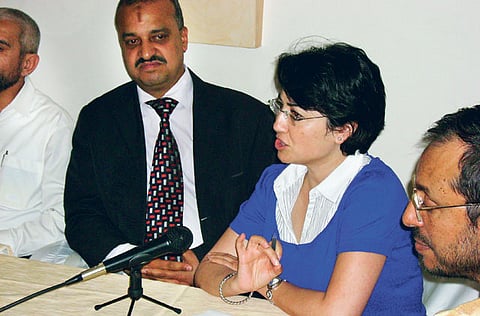Trip home may result in jail term
Group of Palestinians in 1948 areas determined to go to Gaza despite the risks

It would take up to an hour and a half for an Israeli citizen to drive from their city or town to the Gaza Strip. But for five Palestinians in 1948 areas it is a journey that will take almost a week to complete.
"I remember when I first went to Gaza, It was so strange," says Lubna Masarwa, who sits on the board of directors of the Free Gaza Movement.
"I live in [Occupied] Jerusalem, but I had to go all the way to Larnaca to travel by boat to Gaza. When the Palestinian coast appeared, I realised that I am so close to it, yet so far".
Thus, Lubna has chosen to go to Gaza with the Freedom Flotilla for the fourth time, despite being arrested in her last attempt, as it is illegal for Israelis to enter Gaza. For her, it is simply a trip home.
As a Palestinian, Lubna sees it as her natural right to be able to connect and communicate with her people in Gaza, but she cannot. That, says Lubna, is part of Israel's policy of continuously separating the Palestinian people.
"Some people refer to us as Arab Israelis, but we are Palestinian. I can see Gaza from the north [of Israel] and it's just an hour away from me. But there is a border between us that Israel has placed".
Palestinians in 1948 areas were allowed to remain in their homes after the Israeli state was established. Israeli citizenship was forced upon them and they lived under Israeli military rule for decades.
Their situation was prison-like, says Haneen Zoubi, member of the Israeli parliament, the Knesset. From 1948, when Israel was established, until 1967, when Israel occupied the West Bank, Jerusalem and Gaza, Palestinians inside Israel lost connection to their nation.
"Before 1967, we were ghettoised. It was a cultural prison; a mental prison. Cultural exchange was impossible and we couldn't import Arabic books. The cultural centre of Palestine, Yafa [Jaffa], was destroyed, and with it went our cultural heritage."
Lost link
Since then, however, Palestinians in 1948 areas have come a long way in entrenching their Palestinian-Arab identities in their society and have made efforts to rekindle a lost link with the wider Arab world. Their trip to Gaza is part of a bigger effort to send a message to Israel and Palestinians in 1948 areas, that the Palestinian citizens of Israel are not "an internal Israeli issue" and they belong firmly with the Arab world as Palestinians.
"This is also a message to the [Palestinians in 1948 areas] to take action on Gaza… Israel's policy is to divide Palestinians, whether it's by building settlements [colonies] between Palestinian areas, or building walls, or making it illegal for us to marry West Bank Palestinians," she says.
Few in the Palestinians in 1948 areas community know about the reality of Gaza, she says.
"I had no idea what the situation in Gaza would be like. I saw fathers cutting their cupboards up for firewood, and children playing around raw sewage in the streets. I didn't expect any of that".
Palestinians in 1948 areas do not do enough for Gaza, she says, "because whatever you do, it is not enough".
"Arabs in Israel live in a very difficult situation. The Israeli intelligence is always following them. Some Israelis talk of withdrawing our citizenships. But I see more awareness among them of their identities. There is an awakening. That is why Israel sees us a [time] bomb; a threat".
Asked if she fears reprisals in Israel for going to Gaza, Knesset member Haneen says she is not scared.
"The Knesset can lift my parliamentary immunity in 48 hours. They have already started accusing me of treachery. I will probably be detained with the rest and perhaps give them moral support."
Lubna, too, says she is prepared. She believes should Israel detain the passengers on the Freedom Flotilla, the foreigners will be deported quickly but it is the Israeli citizens who will remain in prison, then continuously be harassed by the authorities.
"Israel makes you feel inferior as an Arab; as if you're worth nothing… I may be arrested, I may be attacked and I may die in trying to go to Gaza, but I'm ready to pay the price. There is no freedom without a price".



